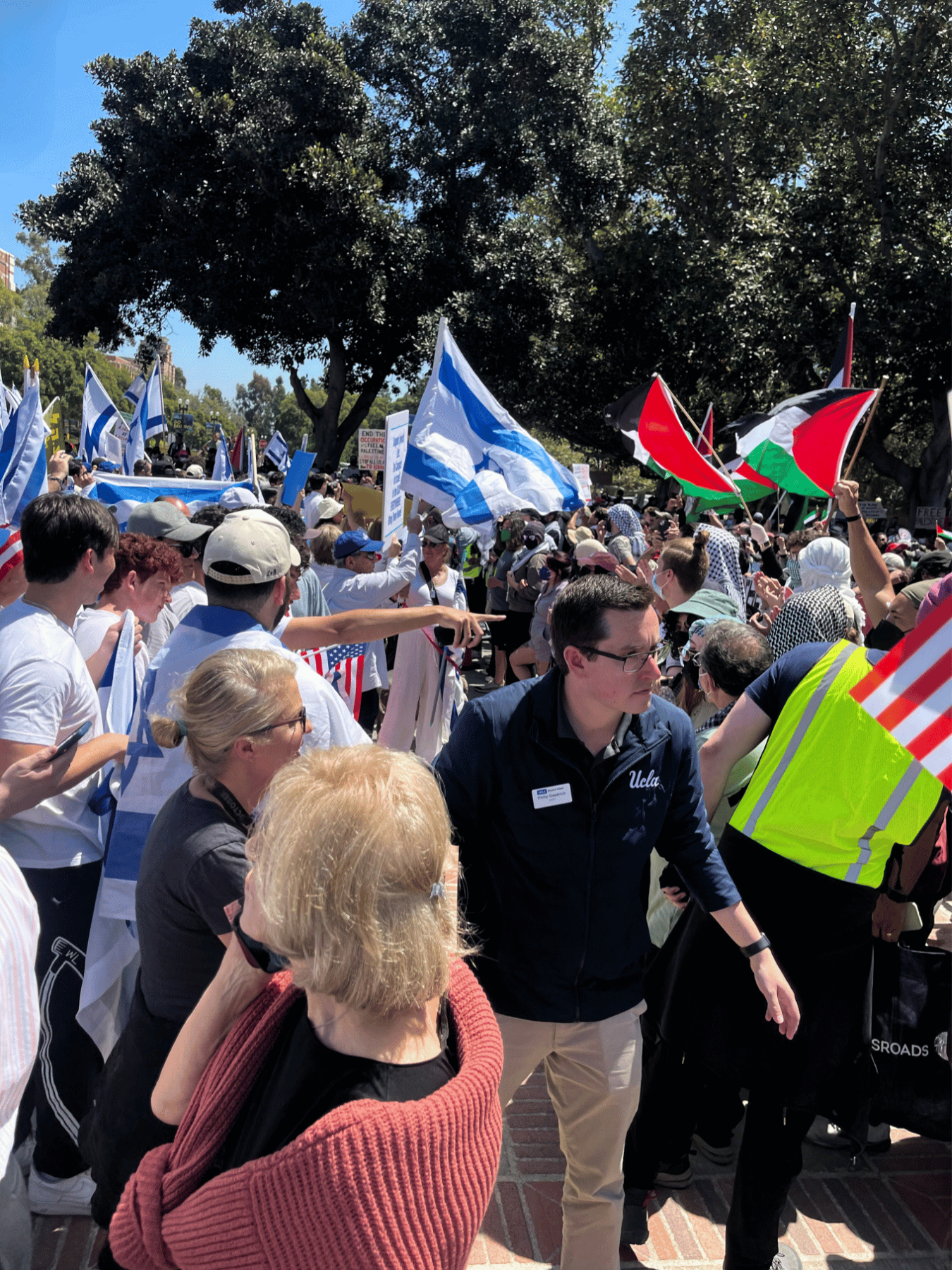Image captured by Hailey Zill
Oscar Wilde once famously said: “Man is least himself when he talks in his own person. Give him a mask, and he’ll tell you the truth.”
Late on Tuesday night, April 30, precisely such a scene unfolded in the heart of UCLA’s campus in Westwood. Adjacent to a pro-Palestinian tent encampment, violent confrontations broke out between masked and hooded groups of demonstrators affiliated with both sides of Israeli-Palestinian debate.
A subsequent hours-long clash was presided over by an almost non-existent law enforcement response. UCLA students, like myself, could watch only helplessly as our usually picturesque campus was being overrun by conflict and chaos. Instead of learning, growth, and discovery, our campus became home to brawling, fireworks launched as projectiles, and pepper spray.
Witnessing our own school devolve into an actual battleground with frenzied mobs running amok was frightening, embarrassing, but quite frankly, not entirely surprising.
How long will these masks, in a metaphorical sense, be allowed to remain on?
Since the pro-Palestinian demonstrators made landfall at UCLA last Thursday and set up a tent-encampment in the Royce Quad — the hub of UCLA’s campus grounds — the school administration had responded with a “hands-off” policy.
In contrast to other universities such as UT Austin, USC, and Arizona State, who took steps to dismantle protests and arrest protestors when necessary, UCLA made a calculated gamble and took a different approach. The school would “respond” to the tactics of the pro-Palestinian protestors without a structured or coordinated response.
Instead, the administrators repeatedly said the university would rely on the goodwill of the demonstrators and the campus community in the hopes that essential university operations could continue uninterrupted.
As a result, UCLA agreed to mostly disengage from the pro-Palestinian encampment, and gave the demonstrators — many of whom likely aren’t even affiliated with the university — autonomy within their own campus. The school agreed not to involve LAPD and other law enforcement agencies, and upheld the rights of free expression that these demonstrators demanded.
With tensions running high on American college campuses since Hamas’ surprise attack in Southern Israel on October 7th, UCLA has obviously been no exception as a lightning rod for activism. For months, pro-Israel and pro-Palestinian groups on campus have mobilized to unprecedented levels. The Israeli-Palestinian conflict has become a daily feature of campus conversation and controversy, and has made its way into the headlines of the Daily Bruin and minutes of the student government meetings.
UCLA administrators, of course, are well aware of this combustible reality present on their own campus.
Perhaps it was naivete, ignorance, dereliction of duty, or an honest mistake. On Tuesday, however, it finally became clear that UCLA’s administration has eaten from the forbidden fruit.
The administration fell into a trap set by the pro-Palestinian demonstrators, who tactfully marketed their encampment as a naturally nonviolent, “peaceful,” and grassroots resistance effort. This, many claimed, could make up for the unlawful nature of the unauthorized demonstration happening in the middle of a university campus.
Still, occupying a central part of campus, the ongoing presence of the hundreds of encamped pro-Palestinian demonstrators, fully-masked and many waving incendiary banners, proved troublesome for intra-campus tensions and acted as an invitation for counter-protestors to engage.
For days, the demonstrators declared that any attempt on the part of the school to shut it down, or even to staff it with appropriate resources to ensure the functionality of campus and safety of the Bruin community, would be interpreted and brandished as an act of aggression. A message contained on a large poster above the encampment was loud and clear to observers: “UCPD, KKK, ‘IOF’ – they’re all the same.”
With an increasingly tense situation brewing on its campus, UCLA had thus found its own hands tied by its reticence. On Tuesday night, this strategy of detente finally morphed into a scene of despair, one fueled by emotions running high amid the brutal war in the Middle East.
Was this outcome inevitable?
Perhaps one of the most striking elements of the battle that occurred on UCLA’s grounds on Tuesday night was that, according to news reports, not a single agitator involved in the chaos has yet been disciplined or held accountable for their actions.
In the aftermath, UCLA is struggling to shake off its new-founded reputation as a hands-off, feeble, and even spineless host of large-scale unrest.
Consequently, in contrast to their core missions as institutions of higher learning, universities have recently become ultra-accessible, fertile ground for politically, socially, or ideological-driven activity. From the perspective of outside agitators, influencers, and activists looking for a home base, universities are now recognized as paralyzed by lawlessness and as reluctant to enforce even their own codes of conduct, let alone the core principles of our society.
All of this has come to the detriment of UCLA students, and most particularly, the Jewish students on campus. School is hardly functioning as it should be; all Bruins have been affected. Libraries have been shut down, the campus spaces have been vandalized, exams have been moved online, and classes have been canceled.
Jewish students are now finding themselves in a state of high alert. We struggle to maintain our focus on academics — how could we, when there is such virulent, anti-Semitic rhetoric and violence occurring uncontested in our own backyard?
At this moment, UCLA is in desperate need of strong leadership, accountability, and lawfulness. A hands-off attitude is only going to exacerbate student distress. Waving the white flag of 1938 simply won’t do.

